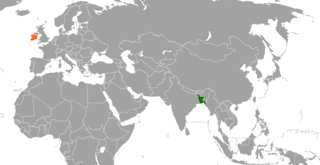Related Research Articles

Christopher Thomas Ewart Ewart-Biggs, was the British Ambassador to Ireland, an author and senior Foreign Office liaison officer with MI6. He was killed in 1976 by the Provisional Irish Republican Army (IRA) in Sandyford, Dublin.

Sir Ivor Anthony Roberts is a retired British diplomat and the former President of Trinity College, Oxford. He was previously British Ambassador to Yugoslavia, Ireland, and Italy. He was knighted in 2000. In addition to his British citizenship, he is now an Irish citizen.

Sir John Eaton Holmes is a British former diplomat who is the current Chairman of the Electoral Commission.

Sir David Norman Reddaway is a retired British diplomat who was High Commissioner to Canada and Ambassador to Ireland and Turkey.
Sir Francis William Stronge, was a senior British diplomat and the second son of Sir John Calvert Stronge and Lady Margaret Stronge. Sir Francis never inherited the baronetcy but was later knighted in his own right.

In the Commonwealth of Nations, a high commissioner is the senior diplomat, generally ranking as an ambassador, in charge of the diplomatic mission of one Commonwealth government to another. Instead of an embassy, the diplomatic mission is generally called a high commission.

Bangladesh–Ireland relations refer to the bilateral relations between Bangladesh and Ireland.

The Embassy of the United Kingdom in Dublin is the chief diplomatic mission of the United Kingdom of Great Britain and Northern Ireland in Ireland. The embassy is located on Merrion Road in the Ballsbridge area of the city. The current British Ambassador to Ireland is Paul Johnston.

The burning of the British Embassyin Dublin happened on 2 February 1972 at 39 Merrion Square. This occurred during demonstrations outside the chancery by a very large and angry crowd, following the Bloody Sunday massacre in Derry on 30 January 1972, when the British Army's Parachute Regiment shot dead 14 unarmed Catholic civilians during a civil rights demonstration.
References
- ↑ Peck, Sir John (Howard). Who Was Who. 1 December 2007. doi:10.1093/ww/9780199540884.013.U174734. ISBN 978-0-19-954089-1.
- ↑ Sir John Peck dies, aged 81, Irish Times , January 14, 1995
- ↑ IRA Tactics and Targets, J. Bowyer Bell, Poolbeg, 1990, page 71
- ↑ Obituary: Sir John Peck, The Independent , 20 January 1995
- ↑ The Economist, Volume 267, Issue 3, 1978, page 134
- ↑ Whitaker's Almanack, J. Whitaker & Sons, 1972, page 795
- ↑ "Peck, Sir John Howard | Dictionary of Irish Biography". www.dib.ie. Retrieved 15 November 2022.
- ↑ The excellent honour of ambassador suits you, sir, Sunday Independent , 16 July 2006
- ↑ 1972: British embassy in Dublin destroyed, On This Day, 2 February 1972, BBC News Online
- ↑ A New History of Ireland, Volume II: Medieval Ireland 1169-1534, Volume 2, Art Cosgrove, OUP Oxford, 2008, page 358
- ↑ Dublin from Downing Street, Sir John Peck, Gill and Macmillan, 1978